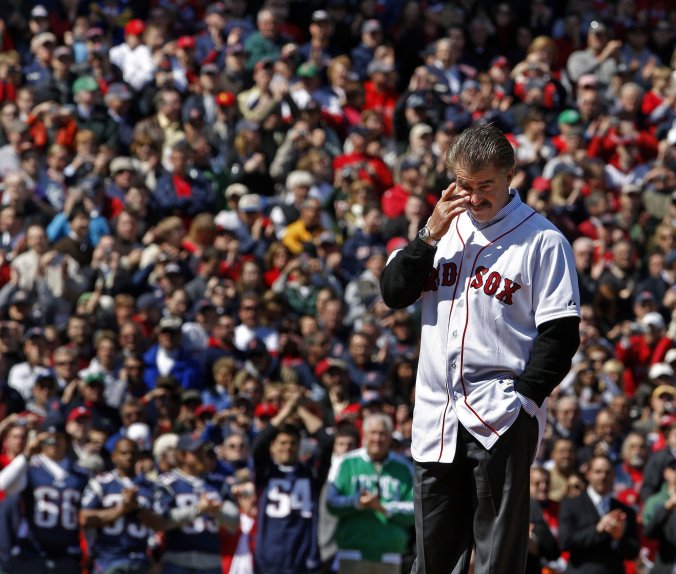
By Bob Nightengale |
It’s so grossly unfair, and so cruel, that people actually believed one ground ball in a World Series Game defined Bill Buckner.
Those can only be the people who never met the man.
Buckner died peacefully Monday morning, according to his wife, Jody, from Lewy Body Dementia. He was 69 years old.
“Bill fought with courage and grit as he did all things in life,’’ Jody Buckner said in a statement released to ESPN’s Jeremy Schapp. “Our hearts are broken, but we are at peace knowing he is in the arms of his Lord and Savior Jesus Christ.’’
It would be an easy narrative to believe he died of a broken heart, too, but he refused to let the grounder that squirted between his legs in Game 6 of the 1986 World Series against the New York Mets ruin his life.
Oh, sure, he was the subject of jokes and cruelty. There were Red Sox fans who never forgave him, blaming him for losing the World Series, and extending their drought until finally winning the World Series in 2004.
There was no need to let facts get in the way of the storyline.
The Red Sox, one out away from winning their first World Series since 1918, had already blown a two-run lead in the 10th inning of that game. It was Mookie Wilson’s grounder that went through Buckner’s legs that scored the winning run.
And it was the only play that was remembered, and recounted over and over, that Buckner heard for the rest of his life.
Yet, instead of running from the blunder, he embraced it. Took full responsibility.
Who knows if pitcher Bob Stanley would have gotten to the bag quick enough? Why was he still in the game with a troublesome ankle instead of usual defensive replacement Dave Stapleton? And why was reliever Calvin Schiraldi still in the game after giving up three consecutive hits with two outs in the 10th inning, with Stanley relieving him, and promptly throwing a wild pitch that tied the game?
Buckner never asked those questions. Never passed the blame. If everyone wanted him to be the scapegoat of the entire series, he was fine taking the onus.
That was Buckner, who I had the pleasure of covering briefly with the Kansas City Royals, and when the subject came up, never, ever did Buckner express anger or resentment. He talked about it whenever asked.
Why, he even co-autographed thousands of the pictures with Wilson, appeared in card shows together, and they were even in a beer commercial together.
The man epitomized class, besides being a ferocious competitor, winning the 1980 batting title with the Chicago Cubs, twice leading the National League in doubles in 1981 and 1983, and producing 2,715 hits in his 22-year career.
Oh, and the year the Red Sox made it to the World Series, guess who led them there?
Buckner hit 18 homers and drove in 102 runs that season, including .340 with eight homers and 22 RBI in September. And in Game 5 of the American League Championship Series, it was Buckner who led the Red Sox’s famous ninth-inning rally off Donnie Moore of the Los Angeles Angels, resulting in Dave Henderson’s heroic homer.
“No one played harder than Bill,’’ former teammate Dwight Evans said. “No one prepared themselves as well as Bill Buckner did. And no one wanted to win as much as Bill Buckner.’’
It didn’t matter that none of his teammates ever blamed Buckner. He still received death threats. He was booed by the Red Sox fans. The Red Sox released him the following summer. He would return a final time in 2008 with the Red Sox, receiving a standing ovation during the player introductions at their home opener.
“I think what bothered me the most,’’ Buckner told the Boston Globe years later, “is the people — my immediate family and mother, wife, kids — I think it was unfortunate that they had to endure it, because it was a lot harder on them than on me because they didn’t like to see how people were treating me.”
Buckner, who refused to attend the 20-year celebration of that team in 2006, accepted the Red Sox’s invitation to throw out the first pitch at the 2008 home opener. While the 2007 World Series championship banner was being unfurled, Buckner received a two-minute standing ovation.
“I really had to forgive, not the fans of Boston, per se,’’ Buckner told reporters after the game, “but I would have to say in my heart I had to forgive the media for what they put me and my family through. So, I’ve done that and I’m over that.’’
Buckner retired baseball after the 1990 season, moved his family to Idaho, where he worked in commercial real estate while investing in car dealerships. He was the Chicago White Sox’s hitting coach in 1996 and 1997. He managed the Brockton Rox of the Can-Am League in 2011, and was the hitting instructor for the Class A Boise Hawks in 2012.
Still, all of those years later, he was forever asked about the play that he refused to let define him.
“It just amazes me,’’ Buckner told ESPN in 2003. “I don’t quite get it. I have come to the understanding that it is here to stay, so I try to look at it in a positive way.
“Everybody still remembers me, they say, ‘Yeah, he was the guy that made the error, but he was a pretty good player.’ So I guess that is a positive about it.’’
He also happened to be one of the classiest gentlemen I’ve ever met in the game of baseball.
That’s what I’ll choose to forever remember.
This article was republished with permission from the original publisher, USA Today. Follow Bob Nightengale on Twitter and Facebook.